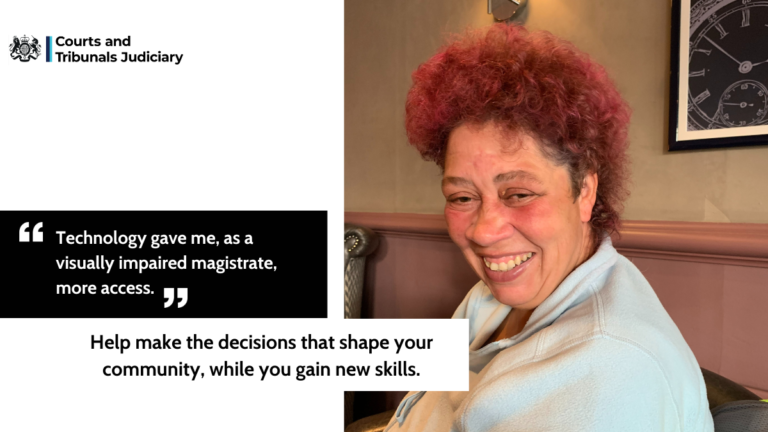Having a disability won’t stop you becoming a magistrate

As we celebrate International Day of Persons with Disabilities, we share the story of Sarah who has been a magistrate for almost 20 years. Sarah felt her visual impairment would get in the way of her becoming a magistrate. But when she finally applied, she quickly realised how the process was catered to her needs and helped her succeed in the role. Sarah shares her inspiring story in her own words.
In 2003, I heard an advert to become a magistrate. I thought that it was something I would really like to do, but I did not know if my visual impairment would be a problem or even if I could apply because of my disability. For the next year or so, I thought about becoming a volunteer and in the end, I applied.
After a few months, I received an invite for an interview. Before online interviews were a thing, all interviews were held in person. On the day of the interview, myself and my guide dog at the time (Gable) arrived at the magistrates’ court and were greeted by Sue. She helpfully had all the interview materials copied into large print. In the interview, everyone introduced themselves which let me know where they were sitting and who was asking the questions. I received assistance for reasonable adjustments throughout my application process.
In December 2004, I received a letter from the Lord Chancellor saying that I had been appointed as a magistrate.
Training and visits
By January 2005 I had started my magistrates training. This included meeting my colleagues, touring the magistrates court and learning about the law and sentencing guidelines. I also visited Hull docks and saw the customs dogs in action.
Becoming a magistrate
To help me, the sentencing guidelines, adult court bench book and family bench book were all produced in braille for me.
In April 2005, all six of my cohort had their swearing in ceremony as a magistrate at the Guild Hall in Hull. The group’s family were invited as well as two Crown Court judges, the magistrates court district judge and some magistrates court staff. As I could not read the oath because I could not see it, a member of my group read each line and I repeated it after them.
Three years after submitting my application to become a magistrate, I found myself sitting in the adult court as a winger. I wanted to choose a second bench, for example family or youth.
One of the managers suggested to go for youth as it involved less reading. I do like a challenge! So, I picked family. I got my family court bench book in braille and sat in the family court for the next five years. But with my sight deteriorating, I resigned from the family bench to concentrate on the adult bench.
When in the adult court, I became a Presiding Justice. This training took place over two days. Once again, the training materials were provided to me before the training via email and my husband helped me with the route from the station to the court.
I now also sit in the Crown Court and the in/out of hours search warrants.
Assistive technology
When the sentencing guidelines app for the iPad released, this gave me, as a visually impaired magistrate, more access. I felt more included when sitting, because the braille bench book went very quickly out of date. Also, the iPad had a helpful voiceover feature, so it could read out what was on the screen.
When the court moved over to using laptops, I had an assessment for IT equipment by the Royal National Institute for the Blind (RNIB).
I now have a laptop especially for my work in court with all court apps included, as well as some special software for visually impaired people called ‘Fusion’. Having Fusion enables me to read all the court information which my other colleagues are able to read.
Also, for any training that takes place, the trainers send me materials by email if I let them know I have a visual impairment. They read out the presentation and any other information they show through Teams (Fusion is unable to read text if scanned as a picture, or when showing a presentation).
Why you should become a magistrate
I would highly recommend becoming a magistrate and for me there are many benefits.
- Gaining new skills and knowledge
- Meeting new people
- Becoming confident articulating my thoughts and speaking in public
- Feeling like I am giving something back to my community
The main thing I want to highlight is that if you do have a disability, do not let this deter you from becoming a magistrate. There are so many reasonable adjustments available, and the benefits outweigh the negatives. I find the role very rewarding.
Become a magistrate
Our new application process has reasonable adjustments for those who need it. We will support you from your first stage of the process right throughout your journey. Check our frequently asked questions for more information about reasonable adjustments. We’re looking for someone like you to represent your community – start your journey to becoming a magistrate now.
